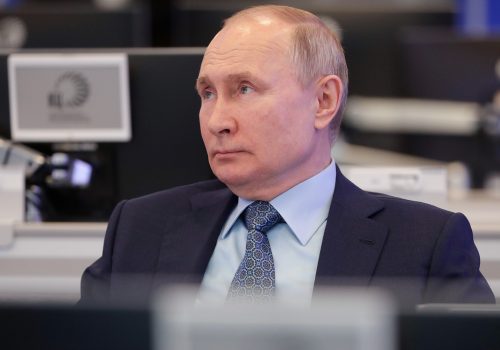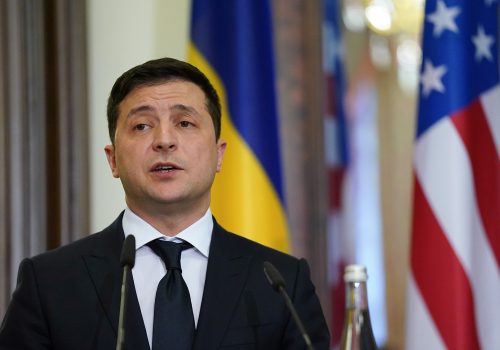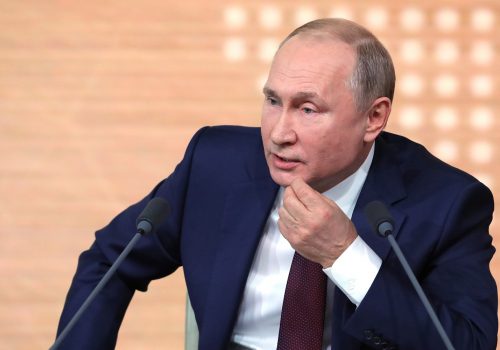FAST THINKING: Biden hits back at Putin
JUST IN
The bank is closed. Today the Biden administration hit thirty-two Russian government officials and entities, plus six companies, with economic sanctions in retaliation for the SolarWinds hack, 2020 election interference, and other Russian malfeasance. The measures include a ban on US financial institutions buying Russian government debt in primary markets, which has sent the ruble and Russian bond prices tumbling. What measures matter most? What does it all mean for US-Russia relations? And will these moves actually deter future Russian aggression? Our crack team of sanctions and Russia experts is here to explain.
TODAY’S EXPERT REACTION COURTESY OF
- Daniel Fried (@AmbDanFried): Weiser Family distinguished fellow and former US assistant secretary of state for Europe and Eurasia
- Anders Åslund (@anders_aslund): Senior fellow at the Eurasia Center
- Brian O’Toole (@brianoftoole): Nonresident senior fellow at the GeoEconomics Center and former senior US Treasury Department official
- John Herbst (@JohnEdHerbst): Director of the Eurasia Center and former US ambassador to Ukraine
- Julia Friedlander (@jfriedlanderdc): C. Boyden Gray senior fellow, deputy director of the GeoEconomics Center, and former National Security Council director
Zooming in
Dan spins through some of his main takeaways from diving into the details of the US response:
- While the Biden administration’s “move against new (primary market) Russian state debt goes further than the Trump administration” did, the action “could have been stronger” by, for example, “going after the secondary market in debt.” But the White House announcement notes that the Treasury Department “has the authority to expand sovereign-debt restrictions” on Russia.
- “Today’s sanctions actions leave room for escalation” if, for example, Putin launches a military offensive against Ukraine. A “less-noticed but important provision in the executive order provides authority for sanctions if Russia cuts or disrupts gas or energy supplies to Europe, the Caucasus, or Asia. That’s a useful warning in the context of the Nord Stream 2 gas pipeline or other potential targets of Kremlin energy pressure.”
- “Missing are actions against Putin-tied oligarchs and cronies. What I hear is that these are being held in reserve. For now.”
Anders points out that while Russia’s external government debt is tiny for an economy of its size, the new US sanctions “put a permanent lid on Russia’s ability to borrow internationally. From now on, Russia cannot increase its public debt significantly. Thus, Russia cannot pursue any fiscal stimulus.”
Zooming out
- Brian provides the big picture here. The Biden administration’s primary goals with Russia are to “try to contain and push back on Putin’s broader assault on Western-style democracy and the rules-based international order,” he notes, and “the centerpiece of this action” is the new executive order.
- What’s the big deal? “No longer will the Biden administration impose sanctions [only] due to Russia’s interference in Ukraine, or Russia’s support to Syrian President Bashar al-Assad, or Russia’s malign cyber activities. Instead, this order makes clear what the threat is: the ‘harmful foreign activities of the Russian government.’ In short, this is an action targeting Putinism in all its malignant forms.”
- It’s an approach, Brian argues, that will give the United States “greater flexibility in both applying and lifting sanctions, which makes US foreign policy more coherent and credible.”
Zooming way out
- John sees the sanctions as consistent with the Biden administration’s approach of “pushing back against Kremlin provocations threatening American interests even as it is willing to seek agreement with it on issues such as strategic-arms limitations.” (Just this week, after all, Biden floated a summit with Putin.)
- But he worries that the message Washington is sending Moscow will be “seriously diluted” by recent reports that “US naval ships heading into the Black Sea have reversed course” and that the US Justice Department “has reversed prior approval for Nord Stream 2 sanctions.”
- The implications of these developments matter for US interests—and not just with Russia, John argues: “Beijing will certainly notice that our ships turned around after Moscow’s statements that their presence could have unpleasant consequences, and this will not enhance our efforts to deter Chinese provocations in the South China Sea.”
Too much at once?
- Today’s actions are largely a “clean-up” job after the Trump administration neglected to respond to Russian offenses in areas such as Afghanistan and cyberspace, Julia tells us. But she’s not sold on the wisdom of issuing such a “sweeping executive order” in this manner—and she warns it could signal danger ahead.
- “The administration could have chosen to respond technocratically, procedurally, incrementally. But now we’re playing big politics,” she says.
- “One could argue—and here I would gladly be wrong—that a single day’s action may increase the Kremlin’s ability to play the aggrieved party for its domestic audience and global sympathizers, and compel Moscow to test US resolve (and rhetoric) through asymmetric action,” Julia notes. “Will Russia understand that today’s moves by the US are intended to wipe the slate clean?”
Further reading
Fri, Jan 21, 2022
What if Russia invades Ukraine (again)? Consider these options for sanctions escalation.
New Atlanticist By Brian O’Toole, Daniel Fried
Whatever Putin’s intentions, the Kremlin’s anti-Ukrainian propaganda has not been so loud since 2014. The United States and its allies need to respond in order to prevent a major military escalation at worst and at least blunt Putin’s effort to gain political advantage through intimidation.
Fri, Apr 2, 2021
FAST THINKING: Russia’s making military moves in Ukraine. What’s it up to?
Fast Thinking By
Russia is massing military forces on its border with Ukraine and in Crimea. Seven years after Russia first invaded Ukraine and annexed Crimea, how did we get to this new point of peril? And what should we expect next?
Fri, Feb 26, 2021
How to deploy economic tools against Putin’s aggression
New Atlanticist By Brian O’Toole, Daniel Fried
Life doesn’t wait for any administration—and neither will Putin. Here's how the US government can deploy sanctions and other tools of economic statecraft as part of a broader Russia policy.
Image: U.S. President Joe Biden delivers remarks at the White House, April 14, 2021. Andrew Harnik/Pool via REUTERS


